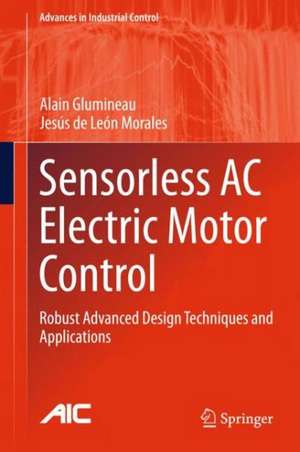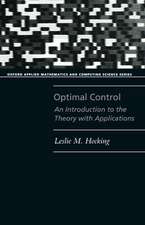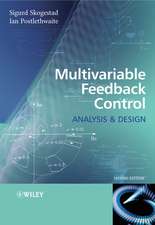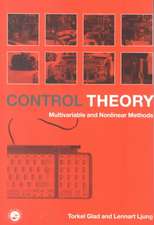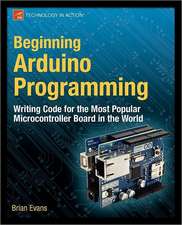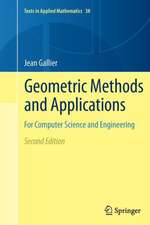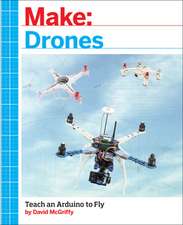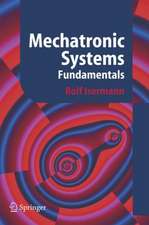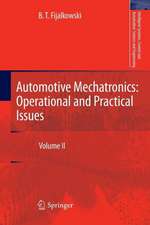Sensorless AC Electric Motor Control: Robust Advanced Design Techniques and Applications: Advances in Industrial Control
Autor Alain Glumineau, Jesús de Leon Moralesen Limba Engleză Hardback – 26 mar 2015
Sensorless AC Electric Motor Control describes the elimination of physical sensors and their replacement with observers, i.e., software sensors. Robustness is introduced to overcome problems associated with the unavoidable imperfection of knowledge of machine parameters—resistance, inertia, and so on—encountered in real systems. The details of a large number of speed- and/or position-sensorless ideas for different types of permanent-magnet synchronous motors and induction motors are presented along with several novel observer designs for electrical machines. Control strategies are developed using high-order, sliding-mode and quasi-continuous-sliding-mode techniques and two types of observer–controller schemes based on backstepping and sliding-mode techniques are described. Experimental results validate the performance of these observer and controller configurations with test trajectories of significance in difficult sensorless-AC-machine problems.
Control engineers working with AC motors in a variety of industrial environments will find the space-and-cost-saving ideas detailed in Sensorless AC Electric Motor Control of much interest. Academic researchers and graduate students from electrical, mechanical and control-engineering backgrounds will be able to see how advanced theoretical control can be applied in meaningful real systems.
Din seria Advances in Industrial Control
- 15%
 Preț: 643.34 lei
Preț: 643.34 lei - 23%
 Preț: 582.63 lei
Preț: 582.63 lei - 18%
 Preț: 783.98 lei
Preț: 783.98 lei - 18%
 Preț: 947.35 lei
Preț: 947.35 lei - 20%
 Preț: 568.24 lei
Preț: 568.24 lei - 15%
 Preț: 643.16 lei
Preț: 643.16 lei - 18%
 Preț: 899.21 lei
Preț: 899.21 lei - 18%
 Preț: 891.33 lei
Preț: 891.33 lei - 18%
 Preț: 740.57 lei
Preț: 740.57 lei - 18%
 Preț: 961.23 lei
Preț: 961.23 lei -
 Preț: 363.80 lei
Preț: 363.80 lei - 15%
 Preț: 645.28 lei
Preț: 645.28 lei - 15%
 Preț: 638.43 lei
Preț: 638.43 lei - 18%
 Preț: 901.11 lei
Preț: 901.11 lei - 18%
 Preț: 1410.94 lei
Preț: 1410.94 lei - 18%
 Preț: 728.91 lei
Preț: 728.91 lei - 20%
 Preț: 1003.77 lei
Preț: 1003.77 lei - 18%
 Preț: 947.35 lei
Preț: 947.35 lei - 15%
 Preț: 643.34 lei
Preț: 643.34 lei - 15%
 Preț: 654.30 lei
Preț: 654.30 lei - 18%
 Preț: 950.52 lei
Preț: 950.52 lei - 15%
 Preț: 644.30 lei
Preț: 644.30 lei - 18%
 Preț: 1393.09 lei
Preț: 1393.09 lei - 18%
 Preț: 950.21 lei
Preț: 950.21 lei - 18%
 Preț: 949.90 lei
Preț: 949.90 lei - 18%
 Preț: 949.42 lei
Preț: 949.42 lei - 18%
 Preț: 950.52 lei
Preț: 950.52 lei - 18%
 Preț: 1113.71 lei
Preț: 1113.71 lei - 15%
 Preț: 650.04 lei
Preț: 650.04 lei - 15%
 Preț: 644.95 lei
Preț: 644.95 lei - 18%
 Preț: 950.33 lei
Preț: 950.33 lei - 18%
 Preț: 948.61 lei
Preț: 948.61 lei - 18%
 Preț: 1112.60 lei
Preț: 1112.60 lei - 15%
 Preț: 644.63 lei
Preț: 644.63 lei - 18%
 Preț: 953.20 lei
Preț: 953.20 lei - 18%
 Preț: 945.62 lei
Preț: 945.62 lei - 15%
 Preț: 640.88 lei
Preț: 640.88 lei - 15%
 Preț: 640.88 lei
Preț: 640.88 lei - 20%
 Preț: 650.92 lei
Preț: 650.92 lei - 18%
 Preț: 1112.60 lei
Preț: 1112.60 lei - 20%
 Preț: 998.36 lei
Preț: 998.36 lei - 15%
 Preț: 643.34 lei
Preț: 643.34 lei - 18%
 Preț: 948.92 lei
Preț: 948.92 lei - 18%
 Preț: 1381.43 lei
Preț: 1381.43 lei - 15%
 Preț: 651.51 lei
Preț: 651.51 lei - 15%
 Preț: 647.08 lei
Preț: 647.08 lei - 20%
 Preț: 563.66 lei
Preț: 563.66 lei - 18%
 Preț: 998.03 lei
Preț: 998.03 lei - 18%
 Preț: 1225.79 lei
Preț: 1225.79 lei
Preț: 894.46 lei
Preț vechi: 1090.81 lei
-18% Nou
Puncte Express: 1342
Preț estimativ în valută:
171.20€ • 176.43$ • 144.53£
171.20€ • 176.43$ • 144.53£
Carte tipărită la comandă
Livrare economică 01-15 martie
Preluare comenzi: 021 569.72.76
Specificații
ISBN-13: 9783319145853
ISBN-10: 3319145851
Pagini: 244
Ilustrații: XVIII, 244 p. 84 illus., 82 illus. in color.
Dimensiuni: 155 x 235 x 18 mm
Greutate: 0.54 kg
Ediția:2015
Editura: Springer International Publishing
Colecția Springer
Seria Advances in Industrial Control
Locul publicării:Cham, Switzerland
ISBN-10: 3319145851
Pagini: 244
Ilustrații: XVIII, 244 p. 84 illus., 82 illus. in color.
Dimensiuni: 155 x 235 x 18 mm
Greutate: 0.54 kg
Ediția:2015
Editura: Springer International Publishing
Colecția Springer
Seria Advances in Industrial Control
Locul publicării:Cham, Switzerland
Public țintă
ResearchCuprins
Dynamical Models of AC Machines.- Observability Property of AC Machines.- Observer Design for AC Motors.- Robust Synchronous Motors Controls Design (PSM and IPMSM).- Robust Induction Motor Controls Design (IM) .- Sensorless Output Feedback Controls for SPMSM and IPMSM.- Sensorless Output Feedback Controls for Induction Motors.
Notă biografică
Alain Glumineau received the PhD degree in Automatic Control in 1981 from the school of Mechanical Engineering, Nantes University, France. Since 1982 he has been with the IRCCyN Laboratory (http://www.irccyn.ec-nantes.fr) in Ecole Centrale de Nantes, France, as Associate Professor then Full Professor. Alain Glumineau's current interests concern theoretical issues in nonlinear control with applications mainly to electric and pneumatic systems.
Jesús de León Morales received the Ph.D. degree in Automatic Control from Claude Bernard Lyon 1 University, France, in 1992. Since 1993, he is a Professor of Electrical Engineering at Universidad Autonoma de Nuevo Leon, Mexico. He is currently working on applications of control theory, electrical machines, nonlinear observers and power systems.
Jesús de León Morales received the Ph.D. degree in Automatic Control from Claude Bernard Lyon 1 University, France, in 1992. Since 1993, he is a Professor of Electrical Engineering at Universidad Autonoma de Nuevo Leon, Mexico. He is currently working on applications of control theory, electrical machines, nonlinear observers and power systems.
Textul de pe ultima copertă
This monograph shows the reader how to avoid the burdens of sensor cost, reduced internal physical space, and system complexity in the control of AC motors. Many applications fields—electric vehicles, wind- and wave-energy converters and robotics, among them—will benefit.
Sensorless AC Electric Motor Control describes the elimination of physical sensors and their replacement with observers, i.e., software sensors. Robustness is introduced to overcome problems associated with the unavoidable imperfection of knowledge of machine parameters—resistance, inertia, and so on—encountered in real systems. The details of a large number of speed- and/or position-sensorless ideas for different types of permanent-magnet synchronous motors and induction motors are presented along with several novel observer designs for electrical machines. Control strategies are developed using high-order, sliding-mode and quasi-continuous-sliding-mode techniques and two types of observer–controller schemes based on backstepping and sliding-mode techniques are described. Experimental results validate the performance of these observer and controller configurations with test trajectories of significance in difficult sensorless-AC-machine problems.
Control engineers working with AC motors in a variety of industrial environments will find the space-and-cost-saving ideas detailed in Sensorless AC Electric Motor Control of much interest. Academic researchers and graduate students from electrical, mechanical and control-engineering backgrounds will be able to see how advanced theoretical control can be applied in meaningful real systems.
Advances in Industrial Control aims to report and encourage the transfer of technology in control engineering. The rapid development of control technology has an impact on all areas of the control discipline. The series offers an opportunity for researchers to presentan extended exposition of new work in all aspects of industrial control.
Sensorless AC Electric Motor Control describes the elimination of physical sensors and their replacement with observers, i.e., software sensors. Robustness is introduced to overcome problems associated with the unavoidable imperfection of knowledge of machine parameters—resistance, inertia, and so on—encountered in real systems. The details of a large number of speed- and/or position-sensorless ideas for different types of permanent-magnet synchronous motors and induction motors are presented along with several novel observer designs for electrical machines. Control strategies are developed using high-order, sliding-mode and quasi-continuous-sliding-mode techniques and two types of observer–controller schemes based on backstepping and sliding-mode techniques are described. Experimental results validate the performance of these observer and controller configurations with test trajectories of significance in difficult sensorless-AC-machine problems.
Control engineers working with AC motors in a variety of industrial environments will find the space-and-cost-saving ideas detailed in Sensorless AC Electric Motor Control of much interest. Academic researchers and graduate students from electrical, mechanical and control-engineering backgrounds will be able to see how advanced theoretical control can be applied in meaningful real systems.
Advances in Industrial Control aims to report and encourage the transfer of technology in control engineering. The rapid development of control technology has an impact on all areas of the control discipline. The series offers an opportunity for researchers to presentan extended exposition of new work in all aspects of industrial control.
Caracteristici
Explains how partial system knowledge can be avoided by making electric motor control robust Provides specific detailed treatment of the observability problem for trajectories of specific hard-to-measure system parameters Details genuine experimental results rather than being confined to simulations Includes supplementary material: sn.pub/extras
